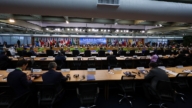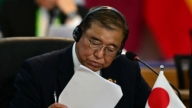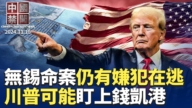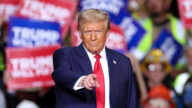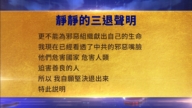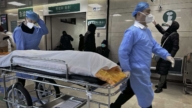【新唐人2012年5月23日讯】温家宝日前在湖北考察时强调:要根据经济运行中出现的新情况和问题,加强改善宏观调控,扩大内需,稳定外需,促进经济平稳较快发展。4月份,中国工业增加值、进出口、固定资产投资和银行新增贷款增长都出现放缓,中共政府采取了多项措施刺激经济,围绕中国经济减速的担忧也有所加剧。
大陆经济学者綦彦臣表示,近年来,中国的工资水平不是上涨,而是逐步下降。中国的经济总体下行,大家都有崩溃的预期。
大陆经济学者綦彦臣:“温总理提振内需的说法有益,但没有实行的可能性,现在好多银行放不出贷款去,现在大家都不想借贷,企业方面的投资愿望小了,当然就业就萎缩,就业萎缩工资他就没有那么多,居民收入就会很大幅度下降,就没法走到提振内需这方面来。”
綦彦臣还表示,由于银行利率太高,增加了产品的成本,另外,企业投资的风险可能因为经济下行而增大,所以企业不愿意再投资,大家反而不愿意贷款。
大陆经济学者綦彦臣:“第三点,税收还是不降,而且随着经济紧缩,各种税收额外的负担对企业还越来越多,甚至维稳也在收费,所以说企业就觉得扩大再生产不合算,所以就出现了不愿贷钱的这么一种极端情况。”
经济评论专家杰森认为,温家宝剩几个月就下台了,还能做什么呢﹖他提出“把稳增长放在更重要位置”的说法,充其量只是个建设性的意见,希望下一届的领导人能听一听。
经济评论专家杰森:“中国的内需问题,也不是他执行一个政策就能解决的。中国目前严重的贫富两极分化,这是造成内需不足的根本原因。另外,房地产对于老百姓资金的占有,还有整个中国不完善的社会保障体系,使得老百姓有钱也不敢花。医疗、养老、教育等等这些问题,不是他说就能做到的,况且他也没有时间去系统的改变中国目前的养老体制、医疗体制,使老百姓敢花钱。”
美国“乔治梅森大学”客座教授章天亮也指出,如果靠政府投资的话,政府投资的那些产业如果没有人消费,将来不赚钱,最后变成银行坏帐。
美国“乔治梅森大学”客座教授章天亮:“所以中国的经济问题,虽然说是经济问题,但其实是政治问题,所以温家宝他想解决国内消费的话,首先得保证社会公平的分配机制,所以温家宝谈国内消费的增加,也是为推他的政治体制上的变革,从经济领域方面做一些推动。”
章天亮表示,中国每年的GDP中,靠国内消费拉动的百分比逐年降低,2003年还有百分之50几,现在的话,降到百分之35左右,他认为,这说明中国的社会问题现在非常严重,贫富差距非常大。
美国“乔治梅森大学”客座教授章天亮:“对于胡温来讲,现在已经没有退路了,那不把经济搞好,将来就得负责任,这个政权也会出现问题,包括接着习近平和李克强他们也不愿意接受一个经济上的烂摊子,其实现在各方,不管是胡温他们想为自己退休以后的安全考虑,还是习近平、李克强为自己接班之后的权力考虑,他们都得必须要在政治上作变革。”
章天亮说,除非胡温准备跟周永康一块儿等着被老百姓清算,否则,他们一定会有动作。
采访/ 梁欣 编辑/周平 后制/仲元
China’s Economy Problem: An Issue of Politics?
China’s Premier Wen Jiabao stressed recently during his trip
to Hubei Province a few points on economic development.
They include, improve macro-control based on new
situations and problems in economic operation;
expand domestic demand and stabilize external demand
to promote steady and relatively fast economic development.
In April, growth in China’s industrial added value,
import and export, investment in fixed assets, and bank new lending have slowed down.
The Chinese Communist Party (CCP) government has taken
several measures to stimulate the economy.
Concerns about China’s economic slowdown
have grown.
China’s scholar in economy Qi Yanchen expressed, in recent
years wage levels in China are not rising, but steadily decline.
China’s overall economy is experiencing a downturn,
and people’s expectations are it would collapse.
Qi Yanchen: “Premier Wen’s words on boosting domestic
demand is good, but it is not feasible to implement.
Many banks cannot lend loans,
as no one wants to get loans.
The interest in business’ investment declines,
causing shrinking in employment and wages.
Many people’s income fell significantly.
Thus it can’t reach the point of improving domestic demand.”
Qi Yanchen also expressed that cost of goods increased
due to bank’s high interest rate.
In addition, investment risk increases
as a result of the economic downturn.
So enterprises do not want to invest or borrow loans.
Qi Yanchen: “Moreover, the tax rate did not decrease.
With the economic contraction, various kinds of taxes have
caused more and more additional burdens to businesses.
They even need to pay fee for “maintaining stability.”
Businesses think it is not worth expanding.
Therefore they do not want to get loans.”
Economic commentator Jie Sen thinks, with Wen Jiabao’s
stepping down in several months, he could not do much.
His statements on “giving stability top priority”
is but a suggestion for the future leadership.
Jie Sen: “The issue of China’s domestic demand
cannot be solved by following his policy.
China has a serious polarization of rich and poor,
which is the root cause of insufficient domestic demand.
Plus, people’s spending in real estate and the inadequate
social security system make people dare not spend.
Issues around health care, pension and education, etc.
cannot be resolved by what he says.
He also does not have time to systematically change
the current pension system, to make people spend money.”
U.S. George Mason University visiting professor
Zhang Tianliang commented on the issue.
He thinks if all depends on the government investment
and people don’t use this set up, it will become a bad debt.
Zhang Tianliang: “China’s economic problem is an issue
of politics rather than an issue of economy.
If Wen Jiabao wants to address domestic consumption,
he first needs to ensure a fair social allocation mechanism.
Therefore Wen’s talk on increasing domestic consumption,
is to push his political reform from an economic angle.”
Zhang Tianliang said, China’s GDP’ domestic consumption
declines each year, from 50% in 2003 to 35% at present.
He thinks China’s social problems are very serious.
There is a wide gap between rich and poor.
Zhang Tianliang: “For Hu and Wen there is no way back.
If they cannot handle economy well, they will be held
responsible in the future and the regime will run into crisis.
Xi Jinping and Li Keqiang don’t want to take over a mess.
In fact either Wen and Hu, or Xi and Li who need to ensure
their power after the transition, must make changes in the political system.”
Zhang Tianliang thinks, unless Hu and Wen want to be
punished by the people together with Zhou Yongkang, they will for sure have to do something about the issue.


